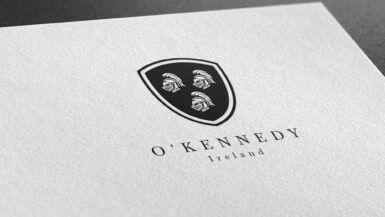Origin of the Surname
The O’Flaherty surname, known in its Gaelic form as Ó Flaithbheartaigh, is one of the distinguished surnames hailing from the emerald isle, bearing with it tales of bravery, aristocracy, and resilience.
Etymology and Meaning
The name Ó Flaithbheartaigh breaks down into two primary components: “Ó” meaning “descendant of” and “Flaithbheartach,” a personal name composed of “flaith,” which translates to “prince” or “ruler,” and “beartach,” meaning “bright” or “brave.” Thus, the name can be interpreted as “descendant of the bright prince” or “descendant of the brave ruler.”
Earliest Known Usage
The surname traces its origin back to the early medieval period in Ireland. The O’Flahertys were chieftains, ruling vast territories in what is today known as Connemara, in western Ireland.
Geographic Distribution
Historically, the O’Flahertys held dominion in the Connemara region, particularly around Lough Corrib and Lough Mask. Their seat of power was Moycullen and later augmented to include areas of County Mayo.
Original Geographic Location
The O’Flaherty clan’s ancestral heartland was the region west of Lough Corrib, with a significant presence in Connemara. Over time, they expanded their influence but always remained closely associated with the rugged beauty of western Ireland.
Migration Patterns
The O’Flaherty clan, like many other Irish families, faced displacements due to English invasions, societal upheavals, and the infamous Great Famine. Many sought greener pastures in the United States, Australia, and other parts of the British Empire.
Historical Context
Notable Historical Events
The O’Flahertys are renowned not just for their chieftain status but also for their spirited resistance against foreign invasions, particularly during the Tudor conquest of Ireland.
Involvement in Key Moments in History
The O’Flaherty clan was instrumental in several uprisings against English rule. Morogh na Mart O’Flaherty, for instance, was a fierce resister of the English advance in the 16th century. Another notable figure, Hugh O’Flaherty, was known as the “Black Oak” and is famed for his resistance against Cromwellian forces.
Notable Irish Bearers of the Surname
Famous Individuals
- Grace O’Malley (Gráinne Mhaol): Though not an O’Flaherty by birth, this legendary pirate queen married Donal an Chogaidh O’Flaherty, chieftain of the clan, strengthening the clan’s maritime prowess.
Influential Figures
- Roderick O’Flaherty (Ruaidhrí Ó Flaithbheartaigh): A 17th-century Irish scholar, antiquary, and historian, Roderick penned “Ogygia,” a chronicle of Ireland’s history, cementing his place as one of Ireland’s foremost historical figures.
Variations of the Surname
Spelling Variations
The anglicization of Irish names has resulted in multiple spellings for many surnames. For Ó Flaithbheartaigh, common variants include O’Flaherty, Flaherty, and sometimes O’Flaverty.
Regional Differences
Depending on regions, especially outside Ireland, the phonetic spelling “Flaherty” is more prevalent. However, in Ireland, particularly in the Connemara region, the traditional O’Flaherty remains dominant.
Current Statistics and Distribution
Frequency and Global Distribution
The O’Flaherty name, though deep-rooted in Ireland, can be found in many corners of the globe due to historical migrations. The United States, Canada, Australia, and the UK have significant populations of the O’Flaherty clan.
Changes Over Time
While the O’Flaherty surname remains an iconic Irish name, its usage in Ireland has slightly waned, possibly due to intermarriage and the dominance of other names. However, its global presence ensures it’s recognized as an emblematic Irish surname.
Family Coat of Arms
The O’Flaherty coat of arms is a testament to the clan’s noble heritage. It features a silver shield with a black hand holding a green serpent, emphasizing valor and wisdom. Above the shield, a traditional helmet signifies nobility, while the crest, a red lion, showcases the family’s ferocity and bravery.






Leave a reply